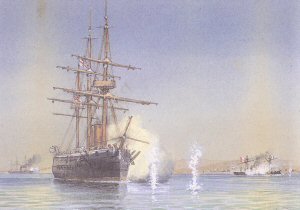Battle of Pacocha
| Incident of Pacocha | |||||||
|---|---|---|---|---|---|---|---|
 Battle of Pacocha |
|||||||
|
|||||||
| Belligerents | |||||||
|
|
Peruvian rebels | ||||||
| Commanders and leaders | |||||||
| de Horsey | Luis Germán Astete | ||||||
| Strength | |||||||
|
1 unarmoured ship: HMS Shah |
1 ironclad ship: Huáscar | ||||||
1 unarmoured ship: HMS Shah
The naval Incident of Pacocha took place on 29 May 1877 when Nicolás de Piérola was leading a revolution to overthrow then Peruvian President Mariano Ignacio Prado. Piérola's supporters used the Peruvian monitor Huáscar as a raiding ship. She harassed the shipping especially off El Callao, the main commercial port of Peru. However, after she boarded some British merchant ships, British authorities sent Rear Admiral de Horsey to capture the vessel. The Peruvian warship managed to outrun the British squadron after a fierce exchange of fire. Huascar guns were undermanned, and the monitor fired just 40 rounds. Shah's mast was damaged by splinters. On the British side, Shah fired 237 shots and Amethyst 190, but none of them carried armour-piercing ammunition. Huascar was hit 60 times, but her armour shield defeated all the rounds. There was a last-ditch effort to stop or sink the rebels when two small torpedo rams from Shah attempted to find the Huascar, but the Peruvian ship managed to escape under the cover of darkness. The rebel crew was forced to surrender their ship to the Peruvian government just two days later.
This battle saw the first use of the newly invented self-propelled torpedo which, at the time, had just entered limited service with the Royal Navy. The torpedo was dodged by the rebel monitor.
...
Wikipedia
